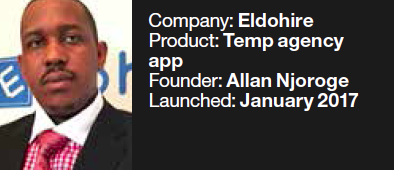Share this article! Eldohire creates on demand work platform Allan Njoroge wasn’t happy when his service industry employer abruptly changed his work schedule one day. Complaining, however, got him nowhere. Work, Njoroge’s boss informed him, isn’t on demand. For a millennial, those are fighting words. “It shouldn’t be your lifestyle fitting your work,” says Njoroge, … Read more
Eldohire creates on demand work platform
Allan Njoroge wasn’t happy when his service industry employer abruptly changed his work schedule one day. Complaining, however, got him nowhere. Work, Njoroge’s boss informed him, isn’t on demand.
For a millennial, those are fighting words. “It shouldn’t be your lifestyle fitting your work,” says Njoroge, a 26-year-old Washington State University-Vancouver student. “It should be work fitting into your lifestyle.”
Taking a cue from sharing economy trends, Njoroge decided to create an on demand work platform. Eldohire, based in Portland, connects employees with employers — as soon as they need them. In essence, the business functions as an app-based temp agency.
The app itself won’t launch until January 16, but Njoroge has been testing protocol and design for the past few months. Applicants will eventually undergo a vetting process that includes an interview, skills tests and background check. Only the top 3% will be accepted; once they’ve made the list, users can log on whenever they want to work and accept an assignment.
Njoroge says the program will help employees redefine work and enable businesses to fill empty shifts without using an expensive temp agency. Fifteen businesses have signed on for beta testing, and another 15 are waiting for the app to launch.
“We’re super lean and we make it super easy for people to hire,” says Njoroge. Eldohire handles payroll, administrative issues and vetting. Businesses simply pay the daily rate and wait for employees to show up. “It’s an Uber lifestyle, but we’ve tried to incorporate it into a business-like setup,” he says.
Njoroge was able to get Eldohire off the ground with seed money from friends and family, along with door-to-door marketing.
The idea of work on demand has its roots in larger flexible workforce trends. More companies offer telecommuting, or flex time, and a growing number offer unlimited time off. And now, with Eldohire, there’s an app for that. “I never found a better way to solve that [on-demand employment] problem until now, when the whole on-demand lifestyle is happening,” Njoroge says.
Startup Tip: New Crowdfunding Regulations
The Securities and Exchange Commission has changed its rules to help startups raise money from smaller investors and utilize local crowdfunding.
Old regulations required that companies provide detailed disclosure materials to nonaccredited investors if raising more than $1 million. And the number of nonaccredited investors could not exceed 35.On October 26, the SEC relaxed these restrictions. Companies can now raise up to $5 million from nonaccredited investors without being required to prepare any specific type of offering materials. The limit on the number of nonaccredited investors is gone.
The SEC also made it easier for companies to conduct single-state crowdfunding offerings, free of federal regulation. The single state exemption had been unavailable if anyone outside the state could access the offering materials, or if the company raising money was incorporated outside the state. Those restrictions have been dropped.
The rule changes give companies new options to consider when raising money. They may facilitate larger offerings that are open to small investors and crowdfunding offerings for residents of a single state.
— Erich Merrill
Miller Nash Graham & Dunn LLP
Where they are now
Track star turned sports snack entrepreneur Nick Symmonds is still in the game. His Run Gum empire doubled revenues from 2015 to 2016. The company
added a new cinnamon flavor, updated packaging and hired a new sales director, Symmonds says via email.
Run Gum v. USATF & USOC, a lawsuit Symmonds filed last year, is currently in the 9th Circuit Court of Appeals. “We expect to have another day in court mid-2017,” Symmonds says via email. The suit alleges that rules forbidding athletes to showcase their sponsors during the 2016 U.S. Olympic Trials limits free competition in the marketplace.







